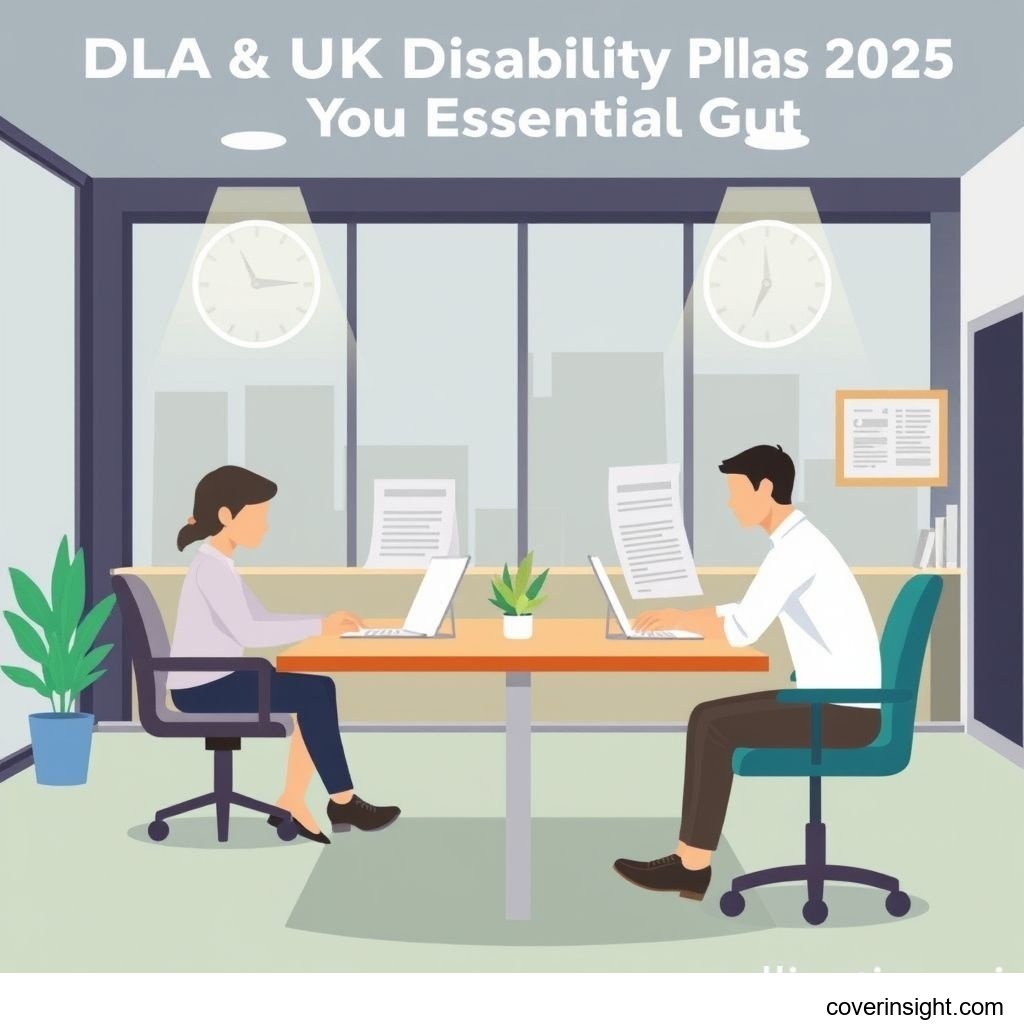Employer vs. Individual Disability Insurance UK 2025: Smart Guide
Introduction
Navigating the world of disability insurance in Great Britain can feel a bit like wading through treacle, especially when you're trying to compare employer-provided schemes with individual policies. As we look towards 2025, understanding the nuances of both is more crucial than ever. For many, the choice between relying on a group scheme offered by their workplace or taking out their own private cover is a significant financial decision, impacting their security should they be unable to work due to illness or injury. This guide aims to shed light on these options, helping you make an informed decision for your future financial resilience.
Coverage Details
What’s Included
Whether it's an employer-provided scheme or an individual disability insurance policy, the core purpose remains the same: to provide a regular income if you become unable to work due to a qualifying disability. Employer schemes, often called Group Income Protection, typically offer a percentage of your salary (e.g., 50% to 75%) for a set period, sometimes up to retirement age. These are generally "own occupation" policies for a certain initial period, meaning you're covered if you can't perform your specific job.
Individual policies, on the other hand, offer much more flexibility. You can tailor the benefit amount, the waiting period (how long you wait before payments start), and the payment term. You can choose between "own occupation," "suited occupation" (your own job or another one you're qualified for), or "any occupation" (any job at all). While "own occupation" offers the broadest cover, it usually comes with a higher premium. Many individual policies also include valuable additional benefits, such as rehabilitation support, partial disability benefits, and critical illness cover riders.
Common Exclusions
Both employer and individual disability insurance policies in the UK come with exclusions, which are circumstances under which a claim won't be paid. Common exclusions typically include:
-
Pre-existing medical conditions: If you had a health issue before taking out the policy and didn't declare it, or if it's explicitly excluded.
-
Self-inflicted injuries or illness: Any harm caused intentionally.
-
Alcohol or drug abuse: Disability arising from substance abuse.
-
Criminal acts: Injuries sustained while committing a crime.
-
Dangerous sports or hobbies: Activities like skydiving or professional motorsport might be excluded or require a special loading on your premium for individual policies. Employer schemes might have broader exclusions in this area too.
-
War and civil unrest: Disabilities resulting from acts of war or civil disturbance.
It's absolutely vital to read the fine print (the policy wording) for any plan, be it from your employer or an individual one, to understand exactly what’s off the table.
Cost Analysis
Price Factors
The cost of disability insurance, whether employer-sponsored or individual, isn't just pulled out of a hat. Several factors play a significant role:
-
Age: Younger individuals generally pay less as they are statistically less likely to make a claim.
-
Health and Medical History: Pre-existing conditions, weight, smoking status, and family medical history can all influence premiums.
-
Occupation: Higher-risk jobs (e.g., construction workers) typically face higher premiums than lower-risk office jobs.
-
Benefit Amount and Term: The more income you want to replace, or the longer you want payments to last (e.g., until retirement vs. 2-5 years), the higher the cost.
-
Waiting Period: A longer waiting period (e.g., 6 months vs. 1 month) means you'll pay a lower premium, but you'll need sufficient savings to tide you over.
-
Inflation Linkage: Opting for your benefit to increase with inflation (RPI or CPI) will increase the premium but protects the buying power of your benefit over time.
For employer schemes, the cost is usually borne by the employer, though some might offer a "salary sacrifice" option where employees contribute pre-tax. Individual policies are paid directly by the policyholder, with premiums usually fixed for the life of the policy or reviewable at set intervals.
Saving Tips
Want to save a few quid on your individual disability insurance? Here are some shrewd tips:
-
Increase your waiting period: If you have a decent emergency fund, opting for a longer waiting period (e.g., 3 or 6 months) can significantly reduce your premiums.
-
Reduce your benefit amount: While you want adequate cover, insuring yourself for 100% of your pre-tax income might be overkill. Consider what you truly need for essential outgoings.
-
Shop around: Don't just go with the first quote. Use an independent financial advisor or comparison sites to get quotes from multiple providers. This is where resources like "Insurance Resources Global" or the "GB Insurance Home" portal can be a good starting point for research.
-
Improve your health: Quitting smoking, reducing alcohol intake, and managing weight can lead to lower premiums over time as your health improves.
-
Consider a 'reviewable' premium: While 'guaranteed' premiums offer peace of mind, 'reviewable' premiums might start cheaper, though they can increase later. This is a gamble, but can save money in the short term.
FAQs
How much does employer vs individual plans cost?
For employer-provided plans, the cost is typically absorbed by the employer, making it "free" to the employee from their take-home pay perspective. However, it's a benefit of employment and forms part of the overall compensation package. Individual plans, conversely, are entirely paid for by the individual. The cost varies wildly, from as little as £10-£15 a month for a basic, younger applicant, to well over £100 for older individuals with higher benefit needs, longer terms, or riskier occupations. As a rough rule of thumb, expect to pay anywhere from 1% to 5% of your gross annual salary for a comprehensive individual policy, depending on the factors mentioned above.
What affects premiums?
As discussed in "Price Factors," premiums are primarily affected by your age, health status (including lifestyle choices like smoking), occupation, the level of benefit you choose, the duration you want the payments to last, and the length of your chosen waiting period before benefits kick in. Policy features like inflation linkage or guaranteed vs. reviewable premiums also play a role.
Is it mandatory?
No, disability insurance is not mandatory in the UK for individuals. While employers might offer Group Income Protection as part of their employee benefits package, employees are not compelled to take out individual cover. However, relying solely on state benefits like Universal Credit or Employment and Support Allowance (ESA) often means a significant drop in income, which can hit hard, particularly if you have dependents or a mortgage. For instance, data from the Department for Work and Pensions (DWP) consistently shows that state benefits typically cover only basic living costs, often far less than one’s working income.
How to choose?
Choosing between employer and individual cover often boils down to assessing your personal circumstances and risk tolerance.
-
Check your employer's scheme: Find out exactly what your employer offers. What percentage of salary is covered? For how long? What are the exclusions?
-
Assess your needs: How much income do you need to cover your essential expenses if you couldn't work? Do you have dependents? A mortgage?
-
Consider the gaps: Employer schemes might not cover 100% of your income, or might only pay out for a limited period. An individual policy can top up this cover or provide protection if you leave your job.
-
Flexibility vs. Simplicity: Individual policies offer more tailored flexibility, while employer schemes are simpler as they are pre-arranged.
-
Cost vs. Value: While employer schemes are "free," an individual policy might offer better value if you need specific, comprehensive coverage.
If you’re still scratching your head, it’s often sensible to speak with a regulated financial advisor. They can help you sift through the options and find a policy that fits your glove. You can find regulated advisors through the Financial Conduct Authority website, which oversees the financial services industry in the UK.
Consequences of no coverage?
The consequences of having no disability insurance coverage can be dire. Without an income when you're unable to work, you risk:
-
Depleting your savings: Your hard-earned savings could quickly vanish, putting your long-term financial goals in jeopardy.
-
Falling into debt: Many people end up relying on credit cards or loans, accumulating significant debt.
-
Losing your home: If you can't pay your mortgage, you could face repossession.
-
Reliance on state benefits: As mentioned, these are typically very low and may not be enough to maintain your current lifestyle. According to the Association of British Insurers, a significant number of working-age adults in the UK would struggle financially after just a few weeks without income.
-
Impact on family: The financial strain can place immense pressure on family members.
Consider the real-world example of David, a self-employed plumber from Birmingham. In 2023, he suffered a severe back injury that left him unable to work for six months. With no employer benefits to fall back on and no individual income protection, David quickly burned through his emergency savings. He eventually had to rely on a combination of Universal Credit and family support, experiencing immense financial stress and delays in his rehabilitation due to limited funds. Had he invested in an individual disability insurance policy, even a modest one, his recovery period would have been far less stressful and financially damaging. It really highlights how essential a safety net can be.
Author Insight & Experience:
Based on my experience living and working in GB, I've observed a common pitfall: many of us are excellent at insuring our cars and homes, but often overlook our most valuable asset – our ability to earn an income. The "she'll be right" mentality sometimes prevails, but when a curveball like a serious illness or injury comes along, the financial reality can be brutal. While employer schemes are a fantastic starting point, they rarely offer a complete solution for everyone. Taking the time to understand your personal income protection needs isn't just about ticking a box; it's about building a robust financial foundation that can weather any storm. It truly is peace of mind that's worth its weight in gold.








Comments